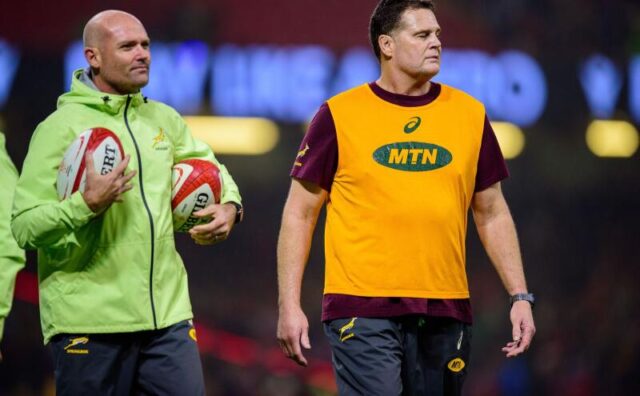A lot of supporters and pundits were asking the Springboks’ coaching staff to settle on a starting line-up who can gel together before the Rugby World Cup. But they had a plan.
Wow … It’s only the second time during the Rassie Erasmus and Jacques Nienaber reign that the Springboks go into a Test match unchanged.
It’s the second time in 64 Test matches … 64. The last time being the opening match of their 2019 Rugby World Cup campaign which they lost 23-13 against the All Blacks.
This year has certainly been another one in which Erasmus and Nienaber have shuffled the pack a lot, sometimes even making more than 10 changes at a time between Test matches.
The chopping and changing seemed to have an impact on the Springboks after the big win over the Wallabies in their first match of the Rugby Championship.
They looked really disjointed against the All Blacks in Auckland, and almost lost against Argentina in Johannesburg following another underwhelming performance.
A lot of supporters and pundits were asking for the coaching staff to settle on a starting line-up who can gel together before the tournament, especially as the All Blacks had followed that approach with top results, which included winning the Rugby Championship.
But the coaches stuck to their plan to give most of the squad an equal number of minutes, even with injuries to key players such as Lukhanyo Am before the tournament.
But the Springboks started to click into gear in the warm-up matches against Wales and the All Blacks where they played some of their best rugby of the season. And now it looks like they are peaking at the right time, unlike Ireland and France, two tournament favourites, who now have to watch the semi-finals and final from the comfort of their couch.
The Springboks followed the same sort of approach in 2019, building squad and system depth by giving players minutes in the legs, even in big Test matches, so that when they are called upon to perform, they do the business.
The Springboks also have a team who may be fresher than most, because the workload has been shared since July.
But now, with the Springboks picking an unchanged team from the quarter-final win over France, they know who their best team is for the way they want to play. From here on in, only injuries or a change in bench strategy will necessitate a change in personnel.
The Springboks have now found a point of stability when it really matters. Six years of tinkering with teams has brought them to this point where they seem calm and comfortable with anything and everything teams will throw at them.
The preparation is over. It’s now up the chosen players to do the business on the field.








